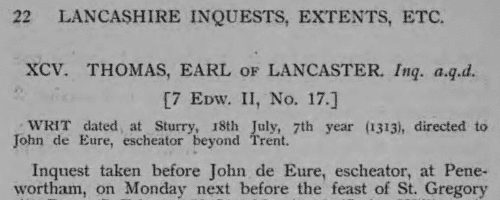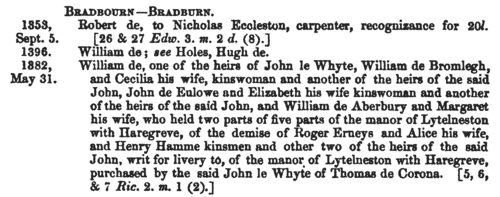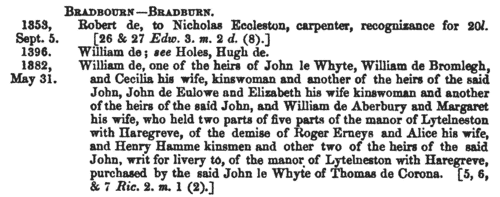Brok Surname Ancestry ResultsOur indexes 1000-1999 include entries for the spelling 'brok'. In the period you have requested, we have the following 73 records (displaying 31 to 40): Single Surname Subscription | | | Buying all 73 results of this search individually would cost £356.00. But you can have free access to all 73 records for a year, to view, to save and print, for £100. Save £256.00. More... |
These sample scans are from the original record. You will get scans of the full pages or articles where the surname you searched for has been found. Your web browser may prevent the sample windows from opening; in this case please change your browser settings to allow pop-up windows from this site. Lancashire landowners and their tenants
(1310-1333)
This compilation of abstracts of Lancashire inquisitions, extents (surveys) and feudal aids (taxes) was prepared for the Lancashire and Cheshire Record Society and printed in 1907, from originals in the national archives of the Public Record Office. Almost all the material has been translated from the original abbreviated Latin: where surnames have been Anglicized, the original is shown in italics, as with the word 'faber' in the sample scan. BROK. Cost: £6.00.  | Sample scan, click to enlarge

| Freemen and citizens of London
(1314-1337)
Letter Book D, or the Liber Rubeus (Red Book) of the City of London contains enrolments of recognizances between inhabitants, particularly citizens, for sums of money lent or due; grants of pieces of land or property; and various records relating to the city administration, minor infractions, &c. In addition, this volume includes the record of admissions to the freedom of the city by redemption (payment of a sum of money), and the binding and discharge of apprenticeships for the same period. Without freedom of the city - which could only be gained by birth (patrimony), apprenticeship or servitude, or by redemption - no man could open a shop, sell goods retail, or even reside within the city walls (except for a limited time, and then only in the houses of freemen and under frankpledge). The text was edited by Reginald R. Sharpe and printed by order of the Corporation of the City of London in 1902.
BROK. Cost: £4.00.  | Sample scan, click to enlarge

| Close Rolls
(1333-1337)
The close rolls of the 7th to 10th years of the reign of king Edward III, that is from 25 January 1333 to 24 January 1337, record the main artery of government administration in England, the orders sent out day by day to individual officers, especially sheriffs of shires: they are an exceptionally rich source for so early a period. In amongst this official material, the rolls were also used as a way of recording many acknowledgments of private debts and contracts between individuals. Most of the contents relate to England, but there are also entries concerning Wales, Scotland, Ireland and the English possessions in France: particularly Scotland, where the king was campaigning during this period. This calendar was prepared by A. B. Hinds of the Public Record Office and published in 1898.BROK. Cost: £4.00.  | Sample scan, click to enlarge

| Inhabitants of Cheshire and North Wales
(1330-1339)
The county of Cheshire had palatine status, being in some measure independent of the rest of England: moreover, from the Statute of Wales of 1284, after king Edward I's subjugation of North Wales, until the union of England and Wales in 1536 to 1543, much of the administration of North Wales (county Flint in particular) was directed from Chester. When the Chester Recognizance Rolls were moved from Chester to the Public Record Office, they were placed among the Welsh Records. These rolls, so called because they do include recognizances (of debts &c.) among their contents, are in fact the Chancery Rolls of the palatinate, containing enrolments of charters, letters patent, commissions and other documents issued under the seal of the palatinate. Deeds and other evidences of a private nature were also enrolled on them. A calendar of the Recognizance Rolls from their commencement to the end of the reign of Henry IV was prepared by Peter Turner and included in the 36th Annual Report of the Deputy Keeper of the Public Records in 1875. We have now indexed this, dividing the enrolments into decades. This is the period from the 3rd to the 13th years of king Edward III.BROK. Cost: £6.00.  | Sample scan, click to enlarge

| Clergy, the religious and the faithful in Britain and Ireland
(1305-1342)
These are abstracts of the entries relating to Great Britain and Ireland from the Regesta of popes Clement V, John XXII and Benedict XII. Many of these entries relate to clerical appointments and disputes, but there are also indults to devout laymen and women for portable altars, remission of sins, &c. This source is particularly valuable for Ireland, for which many of the key government records of this period are lost. Clement V was consecrated and crowned 14 November 1305 (the day from which his pontificate is dated); John XXII was crowned 5 September 1316; Benedict XII 8 January 1335 and died 25 April 1342. From 1309 onwards the papacy was in exile at Avignon. The extracts were made by W. H. Bliss from Regesta lii to cxxxvi, and published in 1895. Bliss remarked that 'although the writing of the Papal Registers of the 14th century is clearer than that of many contemporary English MSS., the entries in them were for the most part founded upon petitions or letters from different countries, and the scribes in the Papal Chancery must have experienced even greater difficulty in copying English proper names than English students experience nowadays in reading the early Chancery Rolls preserved in the Public Record Office. Not having local or personal knowledge, they constantly misread doubtful letters.'BROK. Cost: £4.00.  | Sample scan, click to enlarge

| Close Rolls
(1343-1346)
The close rolls of the 17th, 18th and 19th years of the reign of king Edward III record the main artery of government administration in England, the orders sent out day by day to individual officers, especially sheriffs of shires: they are an exceptionally rich source for so early a period. There is also some material relating to Wales, Scotland, Ireland and the English possessions in France.BROK. Cost: £4.00.  | Sample scan, click to enlarge

| Inhabitants of Cheshire and North Wales
(1340-1349)
The county of Cheshire had palatine status, being in some measure independent of the rest of England: moreover, from the Statute of Wales of 1284, after king Edward I's subjugation of North Wales, until the union of England and Wales in 1536 to 1543, much of the administration of North Wales (county Flint in particular) was directed from Chester. When the Chester Recognizance Rolls were moved from Chester to the Public Record Office, they were placed among the Welsh Records. These rolls, so called because they do include recognizances (of debts &c.) among their contents, are in fact the Chancery Rolls of the palatinate, containing enrolments of charters, letters patent, commissions and other documents issued under the seal of the palatinate. Deeds and other evidences of a private nature were also enrolled on them. A calendar of the Recognizance Rolls from their commencement to the end of the reign of Henry IV was prepared by Peter Turner and included in the 36th Annual Report of the Deputy Keeper of the Public Records in 1875. We have now indexed this, dividing the enrolments into decades. This is the period from the 13th to the 23rd years of king Edward III.BROK. Cost: £6.00.  | Sample scan, click to enlarge

| Inhabitants of London
(1337-1352)
Letter Book F of the City of London contains enrolments of recognizances between inhabitants, particularly citizens, for sums of money lent or due; grants of pieces of land or property; and various records relating to the city administration, minor infractions, &c. The book includes an assessment of the inhabitants in 1346 (pages 143 to 149) listing many householders; a list of mayors and sheriffs from 1189 to 1548 (276-303), and records of the city's use of infangthef (summary execution of certain criminals) down to 1409. The text was edited by Reginald R. Sharpe and printed by order of the Corporation of the City of London in 1904.
BROK. Cost: £4.00.  | Sample scan, click to enlarge

| Grantees of offices, commissions and pardons
(1350-1354)
The Patent Rolls are the Chancery enrolments of royal letters patent. Those for the 24th to the 27th years of the reign of king Edward III (25 January 1350 to 24 January 1354) were edited for the Public Record Office by R. F. Isaacson, and published in 1907. The main contents are royal commissions and grants; ratifications of ecclesiastical estates; writs of aid to royal servants and purveyors; and pardons. BROK. Cost: £2.00.  | Sample scan, click to enlarge

| Testators and legatees in London
(1258-1358)
The mediaeval Court of Husting of the city of London sat (usually on a Monday) each week: among its functions was the enrolment of deeds and wills relating to citizens of London. In their strictest technical sense the terms 'will' and 'devise' are appropriate to real estate, and the terms 'testament', 'bequest' and 'legacy' to personal estate, but this distinction is lost sight of in ordinary usage. This calendar of wills proved and enrolled in the Court of Husting was edited by Reginald R. Sharpe, records clerk in the office of the Town Clerk of the City of London, and printed by order of the corporation in 1889. The date of the court is given in italics, with the year in bold in the margin. The testator's name is given in capitals (surname first, in bold), and then a brief listing of substantial bequests, with the names of legatees, and then the date of making of the will, and reference. Sometimes there were further proceedings in the court relating to the will, such as 'It was found by a jury that the testator was of full age when he made the above testament', a statement as to where the testament had been proved, or proceedings on a challenge to the testament &c. - such additional material is added in a smaller typeface in this edition.BROK. Cost: £4.00.  | Sample scan, click to enlarge

|
Research your ancestry, family history, genealogy and one-name study by direct access to original records and archives indexed by surname.
|












